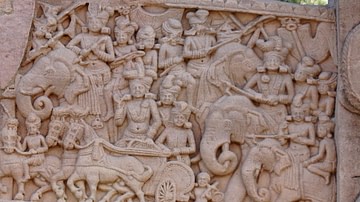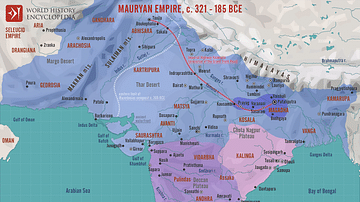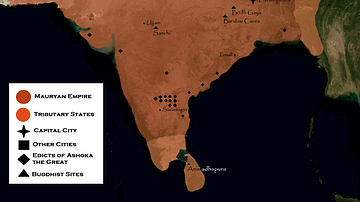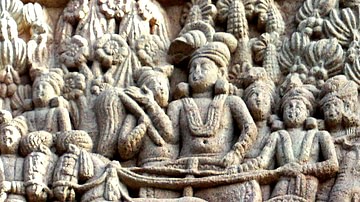Illustration
Bilingual (Greek and Aramaic) inscriptions by king Ashoka at Kandahar (Shar-i-kuna). (3rd century BCE). Preserved at Kabul Museum. Today disappeared. Two-dimensional inscription.
Greek (transliteration)
1. δέκα ἐτῶν πληρη[....]ων βασι[λ]εὺς
2. Πιοδασσης εὐσέβεια[ν ἔδ]ε[ι]ξεν τοῖς ἀν-
3. θρώποις, καὶ ἀπὸ τούτου εὐσεβεστέρους
4. τοὺς ἀνθρώπους ἐποίησεν καὶ πάντα
5. εὐθηνεῖ κατὰ πᾶσαν γῆν• καὶ ἀπέχεται
6. βασιλεὺς τῶν ἐμψύχων καὶ οἱ λοιποὶ δὲ
7. εἲ τινες ἀκρατεῖς πέπαυνται τῆς ἀκρα-
8. σίας κατὰ δύναμιν, καὶ ἐνήκοοι πατρὶ
9. καὶ μητρὶ καὶ τῶν πρεσβυτέρων παρὰ
10. τὰ πρότερον καὶ τοῦ λοιποῦ λῶιον
11. καὶ ἄμεινον κατὰ πάντα ταῦτα
12. ποιοῦντες διάξουσιν.
English (translation)
1. Ten years (of reign) having been completed, King
2. Piodasses (Ashoka) made known (the doctrine of)
3. Piety (εὐσέβεια, Eusebeia) to men; and from this moment he has made
4. men more pious, and everything thrives throughout
5. the whole world. And the king abstains from (killing)
6. living beings, and other men and those who (are)
7. huntsmen and fishermen of the king have desisted
8. from hunting. And if some (were) intemperate, they
9. have ceased from their intemperance as was in their
10. power; and obedient to their father and mother and to
11. the elders, in opposition to the past also in the future,
12. by so acting on every occasion, they will live better
13. and more happily." (Trans. by G.P. Carratelli)
Aramaic
1. שנן 10 פתיתו עביד זי מראן פרידארש מלכא קשיטא מהקשט
2. מן אדין זעיר מרעא לכלהם אנשן וכלהם אדושיא הובד
3. ובכל ארקא ראם שתי ואף זי זנה כמאכלא למראן מלכא זעיר
4. קטלן זנה למחזה כלהם אנשן אתהחסינן אזי נוניא אחדן
5. אלך אנשן פתיזבת כנם זי פרבסת הוין אלך אתהחסינן מן
6. פרבסתי והופתיסתי לאמוהי ולאבוהי ולמזישתיא אנסן
7. איך אסרהי חלקותא ולא איתי דינא לכלהם אנשיא חסין
8. זנה הותיר לכלהם אנשן ואוסף יהותר.
Cite This Work
APA Style
Imaging, W. (2012, April 26). Greek and Aramaic inscriptions by king Ashoka. World History Encyclopedia. Retrieved from https://www.worldhistory.org/image/259/greek-and-aramaic-inscriptions-by-king-ashoka/
Chicago Style
Imaging, World. "Greek and Aramaic inscriptions by king Ashoka." World History Encyclopedia. Last modified April 26, 2012. https://www.worldhistory.org/image/259/greek-and-aramaic-inscriptions-by-king-ashoka/.
MLA Style
Imaging, World. "Greek and Aramaic inscriptions by king Ashoka." World History Encyclopedia. World History Encyclopedia, 26 Apr 2012, https://www.worldhistory.org/image/259/greek-and-aramaic-inscriptions-by-king-ashoka/. Web. 23 Apr 2025.






